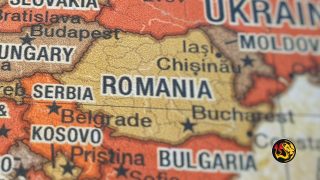
By Stefan J. Bos, Chief International Correspondent Worthy News
BUCHAREST/BUDAPEST (Worthy News) – Romania faced a political earthquake Monday as pro-Russian nationalist Calin Georgescu surged when votes were counted in the country’s presidential election, setting up a neck-and-neck race with Prime Minister Marcel Ciolacu.
With most votes counted, Georgescu received 22 percent of the vote, putting him ahead of Prime Minister Ciolacu, who had 20 percent in an election that could impact Romania’s policies toward war-torn Ukraine.
However, ballots from the sizeable Romanian diaspora, not included in the primary tally, showed a center-right politician, Elena Lasconi, 52, first with 33.4 percent and Georgescu second.
Georgescu’s unexpectedly strong showing was fueled by a campaign on the TikTok social media platform aimed at young voters.
Yet the prospect of the 62-year-old Georgescu, a critic of the NATO military alliance, participating in the presidential runoff vote was due to worry Kyiv.
After putting aside tensions over land and language, Romania is now one of Ukraine’s staunchest allies, capped with the two signing a 10-year security agreement in July.
Bucharest has supplied military aid, such as Patriot missile defenses, since Russia’s full-scale invasion of Ukraine in 2022. It also trains Ukrainian fighter pilots and, soon, marines.
TRADE ROUTES
With trade routes cut off, Romania became a key transit point to global markets for Ukrainian grain and other goods, as it shares the EU’s longest border with wartorn Ukraine.
Perhaps due to that support and the country’s proximity to war, Romania, which shares a 650-kilometer-plus (over 403 miles) frontier border with Ukraine, has seen more Russian military drones flying over or crashing into its territory than any other nation near the armed conflict.
Analysts noticed that fuelled by these tensions, Romania is spending like never before on defense and is becoming more strategically integral to NATO.
It comes amid an eastward shift to face what the Western military alliance deems the biggest threat to European security: Russia.
Yet Georgescu is more pro-Russian than other Romanian politicians, and he shares U.S. President-elect Donald J. Trump’s reluctance to continue supporting Ukraine militarily.
Georgescu also called for an end to the war and questioned the benefits of Romania’s membership in the North Atlantic Treaty Organization.
In 2021, he described NATO’s ballistic missile defense shield in the Romanian town of Deveselu as a “shame of diplomacy” and said the alliance would not protect any of its members should Russia attack them.
PRAISING PUTIN
Earlier in a 2020 interview, he called Vladimir Putin one of the world’s “few true leaders” and said the Russian president loves his country regardless of the means he uses.
“Tonight, the Romanian people shouted ‘peace,’ and they were very loud,” Georgescu told supporters as the results came in.
His rival Lasconi, a former journalist who joined the Save Romania Union (USR) in 2018 and became party head this year, believes in raising defense spending and helping Ukraine. Surveys suggest she would beat Ciolacu in a runoff.
Romania’s president holds a largely ceremonial office but is the military’s commander-in-chief and represents the country at NATO and European Union summits.
The outcome of Sunday’s presidential vote came ahead of parliamentary elections next week.
A survey by influential daily newspaper Libertatea suggested that 30.2 percent of Romanians would vote for the ruling Social Democrat Party (PSD). In comparison, only 13.2 percent backed their coalition partner, the centre-right Liberals.
The Alliance for Uniting Romanians (AUR), a hard-right opposition party founded five years ago that opposes military aid for Ukraine, would rank second with 21.4 percent. Lasconi’s center-rightUSR would secure 12.7 percent of votes, according to last month’s survey, which had a margin of error of 3.2 percent.
Yet, with the rise of a pro-Russian presidential candidate, several parties were expected to rally hard to impact the outcome of the December 1 parliamentary vote.
Copyright 1999-2026 Worthy News. This article was originally published on Worthy News and was reproduced with permission.
Latest News from Worthy News
A passenger aircraft carrying 55 people made an emergency landing in shallow water near the main airport in Somalia’s capital, Mogadishu, on Tuesday after suffering technical problems shortly after takeoff, but all aboard miraculously survived without serious injuries, authorities said.
Saudi Arabia has launched the largest reconstruction initiative in Syria since U.S. sanctions were lifted, positioning the kingdom as a central driver of Syria’s postwar recovery.
Ukrainian President Volodymyr Zelenskyy said the United States has given Kyiv and Moscow another deadline to reach a peace agreement, proposing that the nearly four-year war should end by June, as Russia escalates air strikes against Ukraine’s energy infrastructure.
Israeli Prime Minister Benjamin Netanyahu is scheduled to meet Wednesday with President Donald Trump at the White House, as negotiations with Iran enter a decisive and potentially volatile phase. The meeting, set for 11:00 a.m. Washington time, will mark Netanyahu’s seventh face-to-face encounter with Trump since the U.S. president began his second term, underscoring the unusually close relationship between the two leaders.
With the deadline to fund the Department of Homeland Security only days away, Democrats have refused an offer from the White House to strike a compromise over Immigrations and Customs Enforcement changes.
President Donald Trump is weighing deploying a second aircraft carrier to the Middle East as the U.S. continues talks with Iran over its nuclear program.
Ahead of the 2026 midterm elections, Republicans in Congress are pushing forward multiple bills that would standardize election security requirements nationwide.







